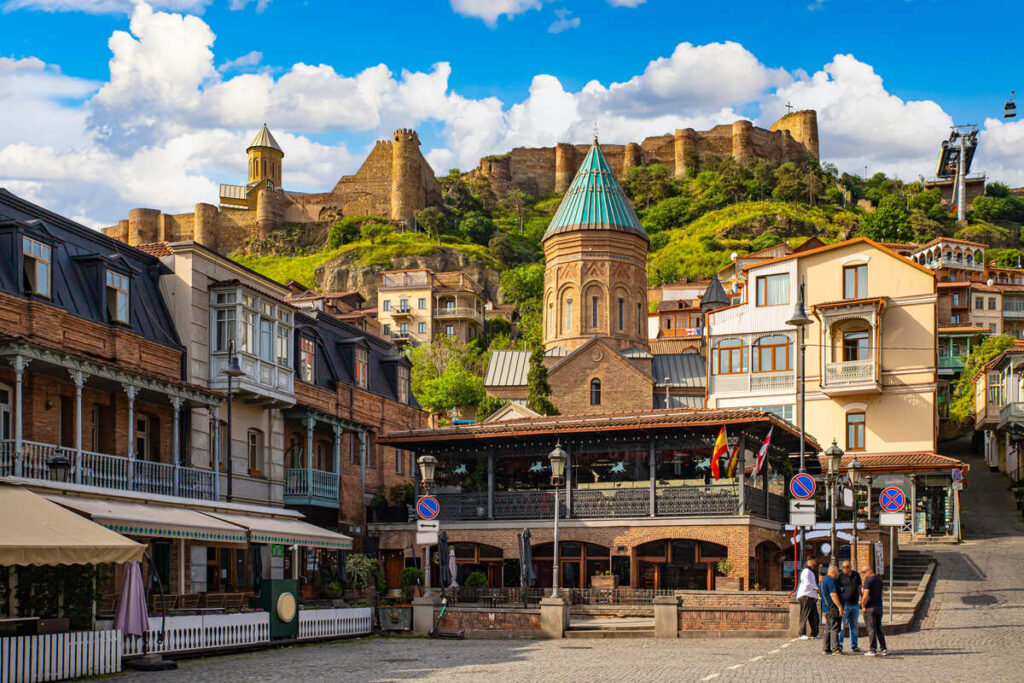Travel Guide
6 European Countries That Welcome Digital Nomads Visa Free For 6 Months Or More
Last Updated
With its slower pace of living, high levels of safety, and cultural wealth like no other, Europe seems to be the end goal of every digital nomad.
Were it not for the overly strict immigration rules and visa bureaucracies, it would be the world’s leading workcation hub.
Perhaps the biggest obstacle is the Schengen rule, which throws cold water on the dreams of remote workers who plan a long-term relocation to Europe.
Foreign guests are not allowed to remain in much of the continent for longer than 90 days.
Luckily, there are at least six countries that are not signatories to the Schengen Agreement and where nomads can stay for six months (or more)–but first, what is Schengen, and why is it a problem?


The Problem With The Schengen Rules
The Schengen Area is a customs union encompassing 29 European countries, including Portugal, Spain, France, Italy, Croatia, where passports checks for internal travel have essentially been abolished, greatly facilitating the movement of people and goods––so far, so good, but there’s one slight caveat.
Nomads and regular tourists can only stay in participating countries for 90 days out of any 180-day period, and with as much as 65% of the continent enforcing this rule, there are not that many places left to go once those are used up.


For instance, if you spend a whole month, or 60 days working remotely from Malta, an increasingly-popular nomad haven in Southeastern Europe, and you plan on traveling onward to Madeira, an island in Portugal hosting nomad retreats, you’ll then only have 30 days left to stay.
It doesn’t matter if they’re separate countries: for control purposes, any day spent in any Schengen country means a day less in another Schengen country––and now you know why these ongoing Schengen accessions trouble workcationers so much.


In the last two years alone, three more countries joined, all of which are fast-rising nomad spots, those being Bulgaria, Croatia and Romania, and with more European states aspiring to join in the future, you can see how this might spell bad news for country-hoppers.
Schengen grows larger every year, and this isn’t something to be thrilled about if your plan is to stay in Europe for longer periods of time without applying for some sort of visa, but we do have good news for you:


These 6 countries remain outside the Schengen Area, either out of choice, or ineligibility, and not only do they not care whether you’ve been present in another European country previously, or how long you’ve stayed, they welcome you for 6 months to 1 year visa-free!
Alright, alright, let’s find out which countries exactly and, most importantly, even what they have to offer nomads:
Albania


One of the most underrated destinations in the Mediterranean, Albania sits outside both the European Union and the Schengen Area, and it generously hosts U.S. citizens for a whole year* without the need to apply for a visa in advance, a residence permit, or pay income tax.
A small coastal nation, it offers endless miles of unspoiled sand-and-pebble coast, hugged by the seas of the brightest blues, and untouristy medieval towns that look almost as if they’ve been ripped off the pages of an illustrated storybook, like Kruje and Gjirokaster.


Though the coast and village-dotted mountainous hinterland are arguably more picturesque, it’s national capital Tirana that welcomes the most nomads in Albania, with its thriving expat scene, cheap Airbnbs and decent internet speed at 40Mbps on average.
As if that weren’t attractive enough, Albania is much cheaper than your average Mediterranean country, with living costs capping at $2,046 per month, according to Nomad List, and lower prices observed for fresh food and groceries, rent and utilities, and other daily expenses.
*Only Americans are allowed to stay in Albania for a year; other foreign nationals are granted 3 months
Georgia


This one’s a tad controversial, as some don’t even consider it to be part of Europe, placing it in Asia instead, while others firmly state it is European in character, and an even more marginal group would class it as being ‘in-between’.
Regardless of where you stand, Georgia has become a global magnet for digital nomads, largely thanks to its open-visa policy: most foreign nationals are eligible for a one-year stay as tourists, and though they’re required to pay income tax after 183 days, that’s usually minimal at only 5%.


As for the country itself, it straddles the natural border between Europe and Asia, defined loosely by the Caucasus Mountains, and it’s famous for its ancient Orthodox churches, Soviet heritage––it’s the birthplace of Stalin!––scenic Black Sea Coast and rolling vineyards.
The national capital is arguably the best place to be based, as it has the best selection of work-friendly cafes, most notably Coffee LAB and Red Man Cafe. Locals are generally friendly, and the cost of living is reasonable by Western standards, capping at $2,122 per month.
England


You’d think England would be one of the toughest countries to stay as a digital nomad, taking into account the whole Brexit saga and hard-line stance on migration conservative British politicians have taken in recent years, but in reality, entry and stay rules are… surprisingly relaxed.
Visa-exempt digital nomads, like Americans and Canadians, can just fly into England without even undergoing passport checks––they’re free to use eGates at most entry points––and provided each stay never exceeds 180 continuous days, they’re good to go.


You read that right: you can stay in England for half a year, exploring all of London’s hidden gems and working remotely from a Bridgerton-like cottage in the Cotswolds without any further requirement other than respecting the 6-month-at-a-time rule.
And by the way, if you’re wondering if working remotely from the U.K. is permitted, the British Government has already clarified digital nomads entering on a tourist visa are not concerned by restrictions on paid work, so long as their income originates from abroad.
Wales


Wales borders England to the west, and it’s a fairytale land dotted with medieval castles and postcardy cobbled towns most foreigners are yet to discover (and much like England, entry rules are nowhere near as complex as mainland Europe’s).
Wales is a constituent country of the U.K. and is bound by Westminster’s immigration policies.
This means it, too, allows nomads to remain for six uninterrupted months, provided their income is foreign-based, and they don’t intend to live in Wales through consecutive visits of six months each.


The two best-equipped Welsh hubs catering to international crowds are Cardiff, its surprisingly-quaint harbor-side capital, dominated by an ancient fortress, and Swansea, the second largest conurbation, and a young university city straddling a long sandy beach.
Wales is perfect for nomads who are looking to go off the beaten track in Britain.
It’s home to several vast natural parks, including Snowdonia, with its snow-capped central peaks, and a rugged coastline interspersed with marine reserves and traditional Welsh-speaking settlements.
Scotland


The fifth country on the list is Scotland, sharing a border with England to the North, and… you guessed it, a member of the wider United Kingdom that takes no issue with foreigners staying for up to 180 days nor working remotely while doing so.
Scotland is best known for its charming historic capital of Edinburgh, a perfectly-preserved medieval city with Gothic spires built around a dormant volcano, the sprawling cosmopolitan hub that is Glasgow, and the dramatic rugged scenery of the Highlands.


Besides the Edinburgh-Glasgow duo, other Scottish cities that could accommodate nomads, with a varied selection of cafes and laptop-friendly eateries are the mid-size Aberdeen, characterized by its granite buildings, and the rapidly-growing, harbor-side Dundee.
As for the kind of nomad who would enjoy a prolonged stay in Scotland, if you’re a lover of pubs, unusual Northern delicacies (and accents), and you love the great outdoors, regardless of the unpredictable weather, you’ll fit right in.
Northern Ireland


Described either as a country or a region, Northern Ireland is the remaining constituent part of the United Kingdom, despite being located on the island of Ireland, and needless to say, nomads are also able to relocate here temporarily thanks to the six-month leave to enter.
You know how it goes: a milder climate, even in the peak of summer, good pub banter, historical castles that look plucked out of a storybook for children, and a rugged coast hugged by the rough waters of the North Atlantic.


The largest, and best-prepared city to host international crowds is Belfast, with numerous workspaces and lively Irish pubs––and by the way, if you love History, you’ll be thrilled to learn Belfast is where the Titanic was built, with a landmark museum celebrating the short-lived ship.
Belfast is not for everybody, and certainly not for the kind of digital nomad who would normally escape to Tulum or Bali in winter, but there’s no doubt some will appreciate the culture, the youthful atmosphere, and the Bohemian Queens Quarter.
The U.K. Is Not The Cheapest Nomad Destination In Europe


Price-wise, the United Kingdom (including England, Wales, Scotland, and Northern Ireland) is probably one of the most expensive digital nomad destinations in Europe: yes, the visa policy is highly attractive, and there’s plenty to see and do, but it’s not somewhere you go on a tight budget.
According to Nomad List, nomads in London are expected to spend $5,582 per month, owing to the high cost of living, inflated rent, and consumer prices. Yes, it’s a great place to live and arguably the most exciting capital in Europe, but you need to earn above a certain threshold to enjoy it.


Life in other parts of the U.K. is somewhat cheaper, like in Newcastle upon Tyne, Northern England, where the average monthly expense is $4,754, or even Manchester, where nomads spend roughly $4,000 monthly but don’t go thinking that moving to Britain is the best bang for your buck.
Planning on moving to Europe as a digital nomad? Discover more destinations, and find out where nomads are going here.
↓ Elevate Your Travel↓
Sign Up Now For Travel Off Path Premium! No ads, VIP Content, Personal Travel Concierge, Huge Savings, Daily Deals, Members Forum & More!


✈️Join Our Travel Off Path Community Forum: Where travelers unite, ask questions, share experiences and even find like-minded travel buddies!
SUBSCRIBE TO OUR LATEST POSTS
Enter your email address to subscribe to Travel Off Path’s latest breaking travel news, straight to your inbox.
This article originally appeared on TravelOffPath.com
Opinions expressed here are the author’s alone, not those of any bank, credit card issuer, hotel, airline, or other entity. This content has not been reviewed, approved or otherwise endorsed by any of the entities included within the post.

